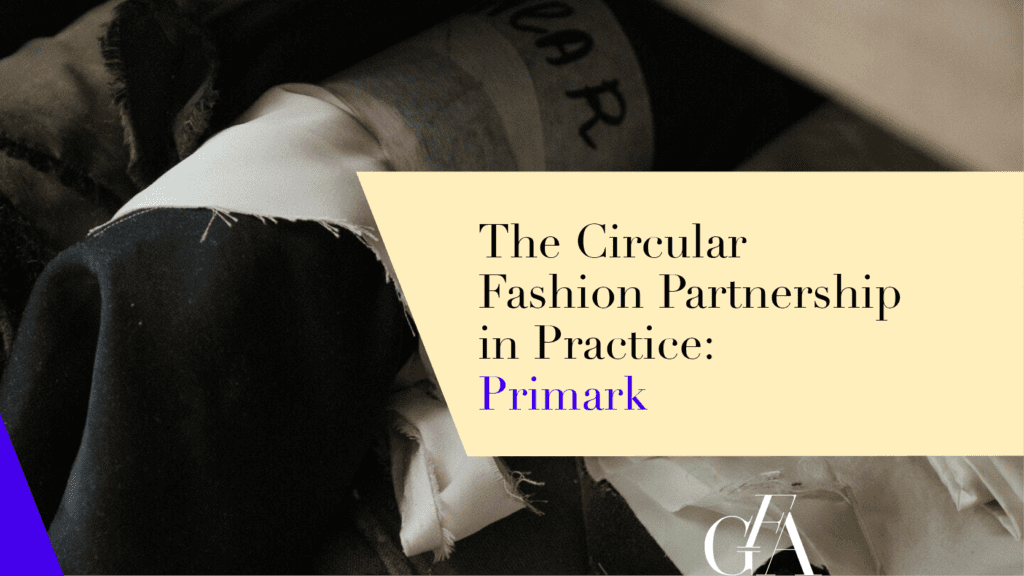The Circular Fashion Partnership in Practice: Primark


Primark is a Supporting Partner of the Circular Fashion Partnership, a cross-sectorial project to support the development of the textile recycling industry in Bangladesh by capturing and directing post-production fashion waste back into the production of new fashion products. Below we learn how the partnership has made an impact at Primark.
The importance of a circular fashion system for Primark
For Primark, a circular fashion ecosystem (aka circularity) is where materials and products are kept in use for longer – put simply, reducing, reusing, and recycling materials. Becoming a more circular business is a key part of the Primark Cares sustainability strategy – the company has committed to making clothes that will last longer, are designed to be recycled, and are made from recycled fibres or more sustainably sourced materials. This is about minimising – and, ultimately, removing – waste in textiles at the start and end of a garment’s life. Primark has been working hard to become a more sustainable business for over a decade but its Primark Cares strategy – launched last year – accelerated this. The organisation has set itself ambitious commitments to change its business model. This includes changing the way Primark makes and sources its products, with a big focus on circularity.
Primark recently appointed a Circular Product Lead to manage this work internally and has begun to train its denim and jersey buying teams, in addition to suppliers, in circular design principles. The brand also views circularity as an enabler to reduce its impact on the planet as an industry and to support Primark’s commitment to halve its carbon footprint by 2030. Over time, Primark hopes to move to a closed loop system, turning old clothes into new, allowing it to increase its use of recycled materials. However, the organisation recognises that the technology to do this is still in its infancy. Nonetheless, Primark is doing what it can to test new innovations, build new partnerships and lead change. This can’t happen overnight, but as the industry evolves and new innovation scales, Primark intends to evolve with it.
Barriers to scaling effective circular systems
Primark recognises that circularity requires a change in mindset and that everyone in the supply chain has the responsibility to change their habits. Like any initiative which requires a change in process or operation, it takes time to implement. With the Circular Fashion Partnership, Primark is engaging with parts of the supply chain that historically it may not have had relationships with, like waste handlers and recyclers. Getting to know how they work has been truly insightful for the organisation and has provided a deeper understanding that the industry must work together to make the change that is required.
To scale effective circular systems, Primark reiterates the need for collaboration. Brands, manufacturers, waste handlers and recyclers need to agree on issues such as waste traceability and output quality – both of which are key to scaling effective circular systems. However, Primark is a large company and the small changes it makes can deliver a huge impact. Therefore, the organisation is committed to utilising Primark’s scale to help deliver change in this space.
Primark’s Circular Fashion Partnership Activities
The Circular Fashion Partnership, led by Global Fashion Agenda, has given Primark the opportunity to explore how it can close the loop, working with some of its suppliers to reframe what it would traditionally have described as ‘waste’ as a new resource instead. The Reverse Resources team have been integral to the Partnership, supporting Primark’s suppliers to segregate their post-industrial textile waste, by colour and composition, so that their textile waste can be matched with a recycler to make new fibres.
When Primark joined the partnership in 2021, it wanted to learn more about the waste infrastructure in Bangladesh and take the learnings to support its ambitions around the Primark Cares strategy and the work it can do with suppliers in this space. Primark worked with three of its suppliers to start this journey and by working together, identified a few key impacts, including:
Better Handling: waste management practices in Primark’s suppliers’ factories improved.
Waste Segregation: waste segregation plays a major role in this project and these factories are now segregating the textile waste according to colour and composition, keeping the textile waste scraps separate from other waste.
Waste Storage: the factories are now storing the textile waste in separate storage areas to avoid contamination.
Record Keeping: the factories are encouraged to keep an accurate record of waste generation, waste composition, colours etc. and the percentage of waste supplied for recycling. They provide all of this data in the Reverse Resources platform.
Traceability: there is complete traceability of waste through the Reverse Resources platform.
Transparency: the factories can identify which recyclers can process their textile waste.
Recycling: one factory has already shipped around 40 tonnes of textile waste, which is 22% of their total waste.
Advance Payment: in this project, factories get the waste value equal to the market value.
Primark’s established environmental sustainability team continue to work with its suppliers on the ground to implement these practices and the organisation is identifying ways to apply these learnings in other sourcing countries.

About Primark
Primark is a leading international clothing retailer employing more than 70,000 colleagues in 14 countries – and growing. Affordability has always been at the heart of Primark. Its vision now is to make more sustainable fashion affordable for everyone. Primark is focused on giving its clothing a longer life, protecting life on the planet, and improving the lives of the people who make its clothes. That’s why Primark has set out to change the way its clothes are made with the Primark Cares strategy, a wide-reaching programme of commitments that Primark is working to achieve by 2030.
Primark is one of Global Fashion Agenda’s Supporting Partners for the Circular Fashion Partnership. Read more about the Circular Fashion Partnership and its various partners here.